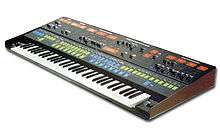ARP String Ensemble
| ARP String Ensemble | |
|---|---|
 ARP String Ensemble | |
| Manufacturer |
Eminent BV ARP Instruments |
| Dates | 1974–1981 |
| Technical specifications | |
| Polyphony | Full |
| Timbrality | Six tones: violin, viola, trumpet, horn, cello, contrabass |
| Oscillator | Sub-octave divider network |
| LFO | Two |
| Synthesis type | Analog Subtractive |
| Filter | None |
| Attenuator | AR |
| Storage memory | None |
| Effects | Chorus on/off |
| Input/output | |
| Keyboard | 49 keys |
| Left-hand control | None |
| External control | Gate out |
The ARP String Ensemble, also known as the Solina String Ensemble, is a fully polyphonic multi-orchestral synthesizer with a 49-key keyboard, produced by Eminent BV (known for their Solina brand), distributed by ARP Instruments from 1974 to 1981. The sounds it incorporates are violin, viola, trumpet, horn, cello, and contrabass. The keyboard uses 'organ style' divide-down technology to make it polyphonic. The built-in chorus effect gives the instrument its distinctive sound.
Technology
The core technology is based on the string ensemble section of the Eminent 310 Unique electronic organ in 1972, manufactured by the Dutch company Eminent BV.[1] The main oscillator consists of twelve discrete tone generators with octave divide-down to provide full polyphony; and the built-in chorus effect utilizes bucket-brigade devices (BBDs) controlled by two LFOs to create the characteristic vibrato.
Notable users
The ARP String Ensemble was extensively used by pop, rock, jazz and disco artists of the 1970s, including Herbie Hancock, Bernie Worrell, and Eumir Deodato. Elton John used an ARP String Ensemble on his hit song "Someone Saved My Life Tonight", the Rolling Stones in their hit "Fool to Cry", the Buggles in "Video Killed the Radio Star", Hall & Oates in their cover version of "You've Lost That Lovin' Feeling and Rick James in "Mary Jane". In 1975, George Harrison used the ARP on his song "You", and the same year the Bee Gees played it on their hit "Nights on Broadway". Stevie Wonder played the famous string line on Peter Frampton's 1977 ballad "I'm in You". The Solina string sound has also been used by Kim and Ricky Wilde, Pink Floyd, Brian Eno, the Cure, Gorillaz, the Chameleons, the Carpenters, Joy Division, Neil Young, Air, Anthony Cedric Vuagniaux and Rikk Agnew. Fleetwood Mac keyboardist Christine McVie used it on the band's Heroes Are Hard to Find album, most notably on her song "Come a Little Bit Closer."
Gallery
 "String Ensemble" section of Eminent 310 Theatre organ
"String Ensemble" section of Eminent 310 Theatre organ- Solina String Ensemble, the original version of ARP String Ensemble, derived from Eminent organ
 ARP Omni, an ensemble-keyboard consists of string/poly synth and bass synth
ARP Omni, an ensemble-keyboard consists of string/poly synth and bass synth ARP Quadra, a multi-keyboard consists of string/poly synth, solo synth, and bass synth.
ARP Quadra, a multi-keyboard consists of string/poly synth, solo synth, and bass synth.
See also
References
- ↑ Reid, Gordon (May 2007). "Eminent 310 String Synthesizer". Sound On Sound.
External links
| Wikimedia Commons has media related to ARP String Ensemble. |
| Wikimedia Commons has media related to sound files from the important registers and pictures. |
- Retrosound - Pictures and Infos of the Solina String Ensemble
- Service Informations scanned as PDF-File